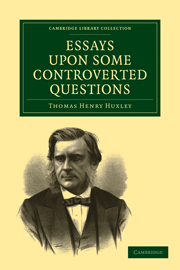Book contents
- Frontmatter
- Contents
- Dedication
- PROLOGUE
- I THE RISE AND PROGRESS OF PALÆONTOLOGY
- II THE INTERPRETERS OF GENESIS AND THE INTERPRETERS OF NATURE
- III MR GLADSTONE AND GENESIS
- IV THE EVOLUTION OF THEOLOGY: AN ANTHROPOLOGICAL STUDY
- V SCIENCE AND MORALS
- VI SCIENTIFIC AND PSEUDO-SCIENTIFIC REALISM
- VII SCIENCE AND PSEUDO-SCIENCE
- VIII AN EPISCOPAL TRILOGY
- IX AGNOSTICISM
- X THE VALUE OF WITNESS TO THE MIRACULOUS
- XI AGNOSTICISM: A REJOINDER
- XII AGNOSTICISM AND CHRISTIANITY
- XIII THE LIGHTS OF THE CHURCH AND THE LIGHT OF SCIENCE
- XIV THE KEEPERS OF THE HERD OF SWINE
- XV ILLUSTRATIONS OF MR. GLADSTONE'S CONTROVERSIAL METHODS
- XVI HASISADRA'S ADVENTURE
V - SCIENCE AND MORALS
Published online by Cambridge University Press: 29 August 2010
- Frontmatter
- Contents
- Dedication
- PROLOGUE
- I THE RISE AND PROGRESS OF PALÆONTOLOGY
- II THE INTERPRETERS OF GENESIS AND THE INTERPRETERS OF NATURE
- III MR GLADSTONE AND GENESIS
- IV THE EVOLUTION OF THEOLOGY: AN ANTHROPOLOGICAL STUDY
- V SCIENCE AND MORALS
- VI SCIENTIFIC AND PSEUDO-SCIENTIFIC REALISM
- VII SCIENCE AND PSEUDO-SCIENCE
- VIII AN EPISCOPAL TRILOGY
- IX AGNOSTICISM
- X THE VALUE OF WITNESS TO THE MIRACULOUS
- XI AGNOSTICISM: A REJOINDER
- XII AGNOSTICISM AND CHRISTIANITY
- XIII THE LIGHTS OF THE CHURCH AND THE LIGHT OF SCIENCE
- XIV THE KEEPERS OF THE HERD OF SWINE
- XV ILLUSTRATIONS OF MR. GLADSTONE'S CONTROVERSIAL METHODS
- XVI HASISADRA'S ADVENTURE
Summary
In spite of long and, perhaps, not unjustifiable hesitation, I begin to think that there must be something in telepathy. For evidence, which I may not disregard, is furnished by the last number of the Fortnightly Review that, among the hitherto undiscovered endowments of the human species, there may be a power even more wonderful than the mystic faculty by which the esoterically Buddhistic sage “upon the farthest mountain in Cathay” reads the inmost thoughts of a dweller within the homely circuit of the London postal district. Great indeed is the insight of such a seer; but how much greater is his who combines the feat of reading, not merely the thoughts of which the thinker is aware, but those of which he knows nothing; who sees him unconsciously drawing the conclusions which he repudiates, and supporting the doctrines which he detests. To reflect upon the confusion which the working of such a power as this may introduce into one's ideas of personality and responsibility is perilous–madness lies that way. But truth is truth, and I am almost fain to believe in this magical visibility of the non-existent when the only alternative is the supposition that the writer of the article on “Materialism and Morality” in vol. xl. (1886) of the Fortnightly Review, in spite of his manifest ability and honesty, has pledged himself, so far as I am concerned, to what, if I may trust my own knowledge of my own thoughts, must be called a multitude of errors of the first magnitude.
- Type
- Chapter
- Information
- Essays upon some Controverted Questions , pp. 209 - 236Publisher: Cambridge University PressPrint publication year: 2009First published in: 1892



